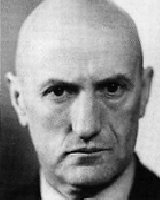Philipp Etter
Philipp Etter (21 December 1891 in Menzingen – 23 December 1977) was a Swiss politician.

He was elected to the Federal Council of Switzerland on 28 March 1934 and handed over office on 31 December 1959. He was affiliated with the Christian Democratic People's Party of Switzerland.
During his office time he held the Department of Home Affairs and was President of the Confederation four times in 1939, 1942, 1947 and 1953. Menzingen 12/21/1891, died 12/23/1977 Bern, Cath., Menzingen. Son of Joseph Anton, cooper master, and the Jakobea Stocker. ∞ 1918 Maria Hegglin, Menzingen. Elementary School in Menzingen district school in train, 1907-11 collegiate school in Einsiedeln. Stud. Jurisprudence in Zurich in 1917 lic. iur. and Schwyzer licensed attorney. Active member of Switzerland. Student Association. As editor of the "Train news" and examining magistrate E. 1918 was chosen for the Conservative People's Party in the Zug cantonal parliament. By 1922 he had moved into the Executive Council, where he took over the education and Military Department. 1927 and 1928 he was Zugerland Ammann 1930 he was elected to the Senate. After the surprise resignation of Freiburg Federal Jean-Marie Musy the Federal Assembly elected the first 43 years of Zug conservatives on 28.03.1934 in the Bundesrat. E. took over the Dep. of the Interior, which in its 25-year term - experienced an increasing importance - particularly through the development of the welfare state. In the prewar years E. was instrumental in the development of the so-called. Spiritual national defense and sat down as a gifted speaker in numerous performances for this one. During the 2nd World War, he took a decidedly conservative, adaptable friendly policy toward Nazi Germany, which is critically evaluated in the hist. Retrospect, and a particularly considerate attitude towards Italy. In the phase of economic and social reconstruction after 1945 he was able to introduce new approaches. He drew et al. responsible for the development of the ETH, the foundation of Switzerland. National Science Foundation, the Alps and the National Road, the expansion of the AVS and the introduction of IV. Polit. Work was characterized by its central Swiss homeland and his Catholic-conservative world view which, inter alia, was permeated by anti-Jewish and anti-Semitic stereotypes. E., who represented the idea of a Christian, corporatist authoritarian state, is one of the most important and most prominent political. Figures of Switzerland in the 20th century. Dr. hc Univ. Freiburg.
External links
- Profile of Philipp Etter with election results on the website of the Swiss Federal Council.
- Philipp Etter in German, French and Italian in the online Historical Dictionary of Switzerland.
- Philipp Etter in the Dodis database of the Diplomatic Documents of Switzerland
| Preceded by Jean-Marie Musy |
Member of the Swiss Federal Council 1934–1959 |
Succeeded by Jean Bourgknecht |
